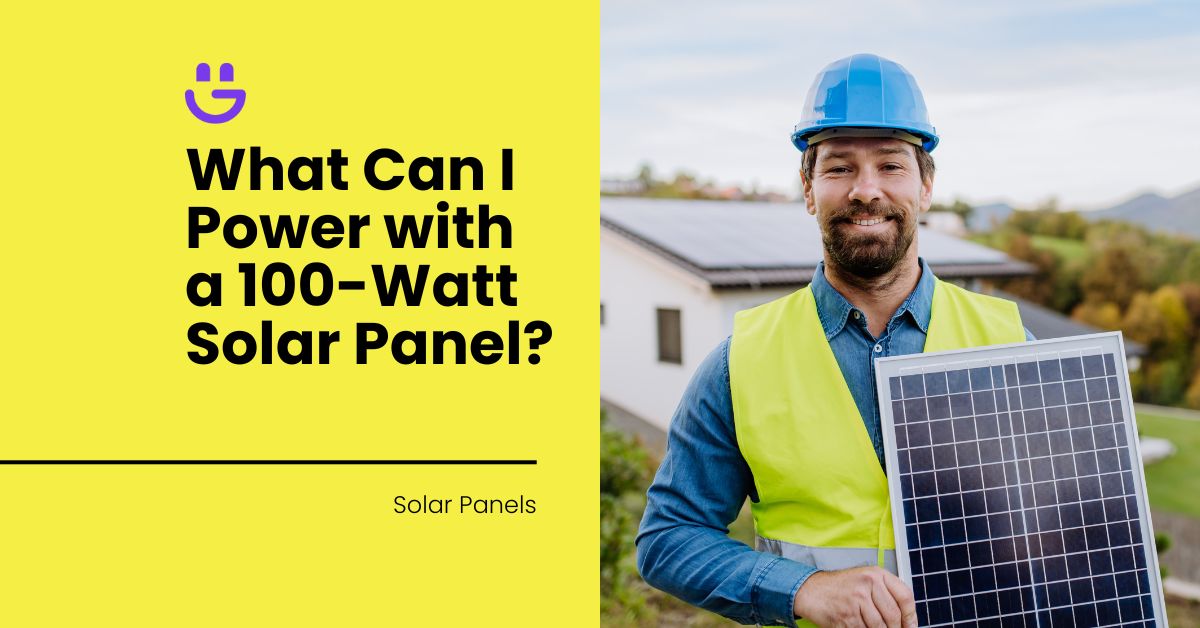Last Updated on November 14, 2025
A 100-watt solar panel can power small devices like cell phones, light bulbs, and ceiling fans. This, along with their compact size and affordability, makes them a great power source for vans, campsites, and off-grid homes.
Thanks to the increased awareness of renewable energy, 100-watt solar panel kits have become an increasingly popular purchase. But are these solar panels suitable for your residential needs and how many appliances can they realistically power?
In this article, we’ll explore the various uses of 100-watt solar panels to help you determine whether or not they are the right option for you and your power needs.
Contents
Which Devices Can be Powered by a 100-Watt Solar Panel?
A 100-watt solar panel can usually run the following devices without issue:
- Phone charger
- Wi-Fi router
- Ceiling fan
- Laptop charger
- LED lights
- Other small appliances
Depending on how much direct sunlight your panel receives, you may not be able to run all these devices simultaneously. Don’t expect a single 100-watt solar panel to be able to run large appliances like fridges, electrical ovens, or air conditioners.
To get a better idea of the capabilities of a 100-watt solar panel, keep the following in mind:
- A 100-watt solar panel can typically run four cell phone chargers for a whole day.
- A 100-watt solar panel can typically run two LED lights for a whole day.
- A 100-watt solar panel can typically run a laptop for roughly 14 hours.
The above information assumes that your solar panel produces 500 watt-hours of usable energy.
Is a 100-Watt Solar Panel Suitable to Power My Home?
A single 100-watt solar panel is not suitable for typical residential use and does not produce enough power for any of your larger appliances. However, a 100-watt solar panel kit may be useful for camping and even small off-grid homes that don’t require a large power output.
In most cases, you’ll need to invest in additional panels if you want to increase efficiency and output to handle your energy consumption needs. The number of residential panels you will need depends on the size of your home and how many electronic devices you have. The typical UK home requires between 4 and 10 solar panels.
Another thing to keep in mind is that a standard solar panel is usually between 250 and 400 watts. This makes a 100-watt solar panel smaller than usual, with its compact size typically being one of its most attractive qualities.
The Pros and Cons of 100-Watt Solar Panels
By exploring the pros and cons of 100-watt solar panels, you should be able to get an idea about whether or not they are the right choice for you.
Pros
- Can run small electronic devices
- Small and compact
- More affordable than traditional types of solar panels
- Flexible solar panels are available
- Good option for campsites, vans, and tiny homes
Cons
- Cannot power large appliances like fridges, heaters, etc.
- Cannot do the job of a solar generator
- 100-watt solar kits are not usually scalable
Interested in Investing in Solar Panels for Your Home?
Do you want to invest in a solar power system for your home? Here at Eco Happy, we provide professional solar panel installation services for homeowners and businesses throughout the UK. Request a free quote today. Answer a few simple questions and we will get back to your with a quote within minutes.
FAQs
How much energy do 100-watt solar panels produce?
100-watt solar panels should be able to produce 100 W of DC power per day during optimal conditions and peak sun hours. However, the UK experiences plenty of cloudy days and the power output will be considerably lower on these days.
On average, you can expect a 100-watt solar panel to produce between 300 and 500 watt-hours of energy per day.
How much do 100 W solar panels cost?
A single 100-watt solar panel kit usually costs around £250. However, most homes require 3.5 kW to 4 kW solar panel systems, and these typically cost between £5,000 and £13,000.
What other solar equipment do I need to run a 100 W solar panel?
To run your 100-watt solar panel smoothly and make the most of the energy output on offer, you’ll need a solar battery and a charge controller. Single solar panel kits usually come with a battery bank and an integrated charge controller.
The battery stores power and can help provide enough energy to run small devices even on a cloudy day. In most cases, these 100-watt solar panel kits come with a lead-acid battery.
Final Thoughts
While you can power a few small devices using a 100-watt solar panel, it would make sense to install a solar array that provides at least 3.5 kW to 4 kW. However, if you like to go camping, spend time living in a van, or reside in a small, off-grid home, a 100-watt solar panel could be the compact and affordable option that you have been looking for.
If you’re ever unsure about the solar panel output you need for your property, don’t hesitate to reach out to professional solar power installers for an expert opinion.






Tom Allen
Solar Expert